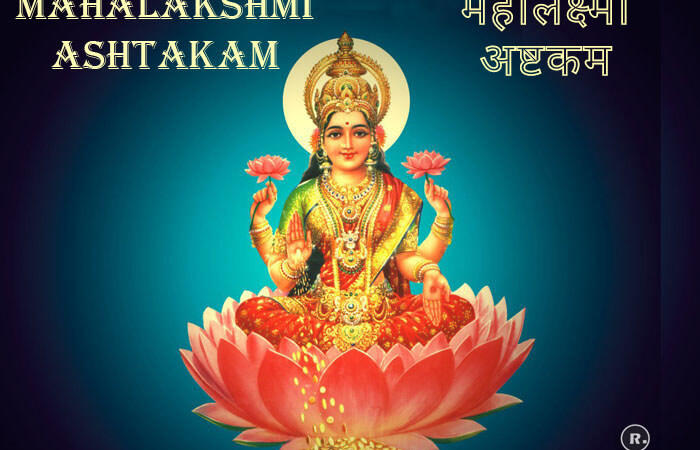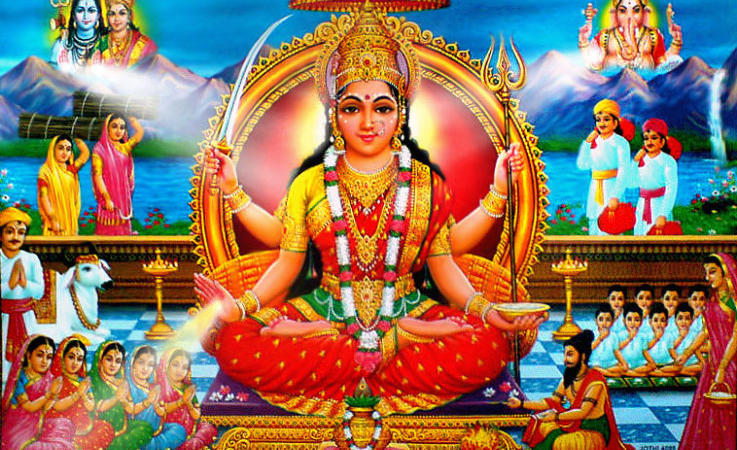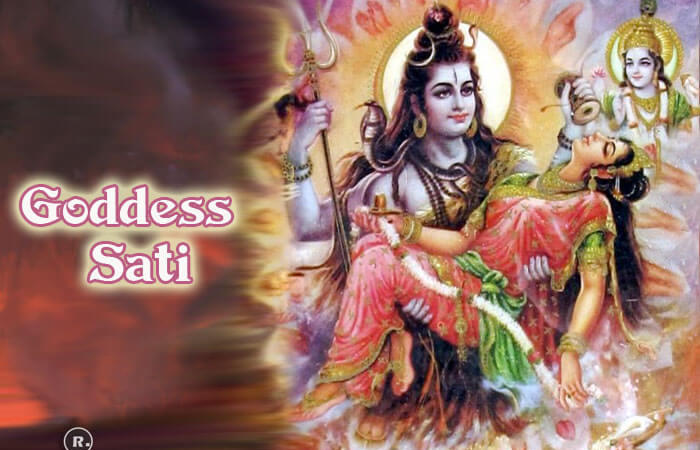Tulsi Vivah Puja
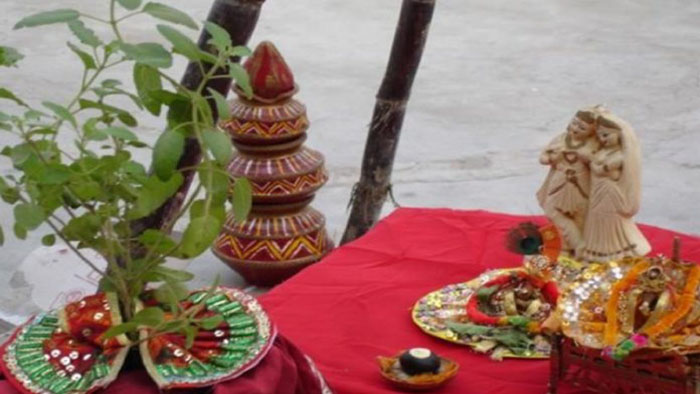
Tulsi Vivah is the mythical marriage of Sri Krishna, an incarnation of Lord Vishnu with the tulsi plant (holy basil). Tulsi Vivah is considered the beginning of the wedding season in India in the month of Kartik, which occurs in October/November every year. It is said that the person who performs the ritual of Tulsi Vivah gets a virtuous fruit equal to Kanyadaan.
Tulsi Vivah Puja is on Friday, November 24, 2023.
Read more about the holy basil
Tulsi Vivah is conducted on the day after Kartik Ekadashi (the eleventh bright day of the new moon, Amavasya). According to Hindu mythology, Devi Tulsi is ceremonially married to Lord Vishnu on this day.
The festival continues for five days and concludes on the full moon day of Purnima. The festival is based on the legend of the marriage (or Vivah) of the holy Tulsi plant with Lord Vishnu. The Tulsi plant is considered holy by many Hindus and traditional Hindu homes used to have Tulsi plants growing in the courtyard.
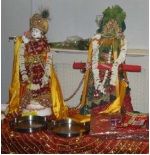
Suggested Read: Advantages And The Importance Of Tulsi
How Tulsi Vivah is celebrated
Tulsi Vivah can be done either in a temple or in your home. A day prior to the Vivah, the tulsī-vrundāvan (a special structure in which the Holy basil plant is grown) is painted and decorated.
Fast is kept on this day and devotees make sure to clean and decorate the house. Special Rangoli and flower decoration are done on this day. The idols of Lord Vishnu and the Tulsi plant are decorated with garlands.
Clean and new clothes are worn for the evening ceremony when the wedding ceremony takes place. The marriage ritual is performed in the evening. Preferably, the puja is conducted sitting westward.
The god and the goddess are dressed up as bride and groom and special mantras are chanted while the wedding rituals are performed. Lord Vishnu’s idol is draped with a dhoti. A thread is used to tie the knot to unite the pairs.
New ornaments like Bangle, mangalsutra, and bindi are gifted to the goddess Tulsi and new clothes are gifted to the groom or the Lord Vishnu. It is followed by donating food to the priests, which was restricted in the previous month. It is believed that after the puja is conducted the surroundings become Sattvik (spiritually pure).
Legend
Offerings were made to the Tulsi plant every morning and evening during the daily prayers. But how can there be a festival devoted to the marriage of a plant and a God? We have to turn to legend and mythology for an explanation.
Tulsi is considered to be an incarnation of Maha Lakshmi, who was born as Vrinda in her previous birth. Vrinda was married to a demon king Jalandhar. But she prayed to Lord Vishnu that her demon husband would be protected, with the result that no God was able to harm him. However, at the request of the other gods, Lord Vishnu took the form of Jalandhar and stayed with the unsuspecting Tulsi. When the truth emerged after Jalandhar’s death, Vrinda cursed Vishnu and turned him to stone (Shaligram), and collapsed. From her body emerged the Tulsi plant. That is why Vishnu pooja is considered incomplete without Tulsi leaves. Since then, every year Tulsi is married to Lord Vishnu and the event is known as Tulsi Shaligram Vivah. It is said that the person who performs the wedding ceremony of Devi Tulsi to Lord Vishnu, considering her to be his own daughter, is considered to earn the punya of performing kanya-daan.
Another legend says that Tulsi came out of the ocean during Amrita manthan as a younger sister of Lakshmi. She was devoted to Lord Vishnu and wanted to marry him but Lakshmi, who was already married to him, did not like the idea and cursed her to become a plant. Thus the Tulsi plant was born. But the all-merciful Lord Vishnu took pity and fulfilling her wish declared that when he will be in the form of a saligram she will remain close to him in the form of a Tulsi leaf.
Suggested Read: Tulsi Chalisa
Tulsi-Aarti
Jai Jai Tulsi Mata
Sab Jag Ki Sukh Daata, Var Daata
Jai Jai Tulsi Mata
Sab Yogo Ke Upar, Sab Rogo Ke Upar
Ruj Se Raksha Karke Bhav Trata
Jai Jai Tulsi Maata
Bahu Putri He Shyama, Sur Balli Hai Graamya
Vishnu Priye Jo Tumko Seve,So Nar Tar Jaata
Jai Jai Tulsi Mata
Hari Ke Shish Viraajat Tribhuvan Se Ho Vandit
Patit Jano Ki Taarini, Tum Ho Vikhyata
Jai Jai Tulsi Mata
Lekar Janam Vijan Me Aayi Divya Bhavan Me
Maanavlok Tumhi Se Sukh Sampati Paata
Jai Jai Tulsi Mata
Hari Ko Tum Ati Pyaari Shyaamvaran Sukumaari
Prem Ajab Hai Unka Tumse Kaisa Naata
Jai Jai Tulsi Mata


